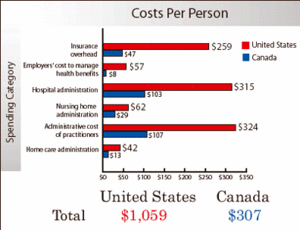It’s a new year and many chiropractors are evaluating what will enhance their respective practices, particularly as it relates to their bottom line. One of the most common questions I get is: “Do I need to be credentialed to bill insurance, and what are the best plans to join?” It’s a loaded question – but one every DC ponders. Whether you're already in-network or pondering whether to join, here's what you need to know.
Blame It on the Administrators!
The New England Journal of Medicine just published a follow-up article to a 1991 study on health-care administrative costs in the United States and Canada.1,2 What the investigators found was outrageous:
- In 1971, 16% of Canada's labor force consisted of health-care administrative workers. By 1996, that percentage had grown to 19.1%.
- In 1969, 18.2% of the U.S. workforce consisted of health care administrators. That number jumped to 27.3% by 1999.
- In 1987, Canada spent $150 per person on health care administration. In that same year, the U.S. spent $450 - three times as much - per person.2
- By 1999, health care administration in Canada had risen to $307 per person. In that same year, the cost per person in the U.S. was $1,059, almost 3 1/2 times as much.
- Health care administration in Canada accounted for 16.7% of health care expenditures in 1999. That number was almost double in the U.S. - 31.0% of health care expenditures were spent on administration.
So, do you want to know where the excess costs are in U.S. health care?
It's in the almost $300 BILLION we spent on administration in 1999 (undoubtedly much higher today.) Compared to what Canada spent, we wasted almost $210 billion in 1999 alone.
Take a good look at the graph above to see where we wasted the money:

The researchers draw the obvious conclusion: "The difference in the costs of health care administration between the United States and Canada is clearly large and growing."
Ironically, the growth in health-care administrative costs coincides with the expansion of managed care. This should not be a huge surprise, in that most DCs have experienced a marked increase in "paperwork" requirements and related expenses. Needless to say, if we have to generate more paperwork, more people will be required on the payer end to read it and file it.
This is probably one of the reasons for the forthcoming implementation of electronic claims processing according to universal (HIPAA) standards. Our hope is that our computers will reduce the costs of paperwork inherent in our U.S. health care system.
But this message still needs to be made clear to the policy-makers who are currently considering eliminating health care benefits because they are too costly. They need to understand it's our health care system that's too costly, not the health care provided.
References
- Woolhandler S, Campbell T, Himmelstein DU. Costs of health care administration in the United States and Canada. N Engl J Med 2003;349:768-75.
- Woolhandler S, Himmelstein DU. The deteriorating administrative efficiency of the U.S. health care system. N Engl J Med 1991;324:1253-8. [Erratum, N Engl J Med 1994;331:336.]
DMP Jr.



